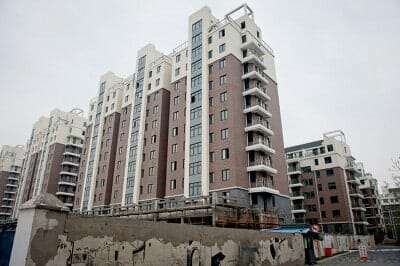China’s housing market is now sliding nationwide, as government statistics released on Friday show falling home prices have spread to 55 of 70 cities surveyed. The drop in housing sales and average prices comes as developers struggle with a glut of unsold homes following years of a stimulus-fueled housing boom.
According to figures published by the National Bureau of Statistics, average new home prices in the 70 cities included in the official poll fell 0.47 percent in June, compared to the previous month. May’s averages were already 0.15 percent below what was recorded in April, which had marked the first time that average prices fell nationwide since 2012.
Perhaps more importantly, the number of cities reporting falling prices increased from 35 cities in May to 55 in June, in the survey of the 70 largest cities in China.
The downward trend is seen as a sign of broader discounting by developers who are faced with large unwanted inventories of unsold homes in many markets. A survey published last month by the China Household Finance Survey and Research Centre at the Southwestern University of Finance and Economics in Chongqing estimated that 22 percent of Chinese homes are currently empty, and developers are expected to continue discounting prices in an effort to clear inventories.
Compared to June last year, average prices nationwide were still up 4.05 percent, but that margin was even smaller than the 5.35 percent annual increase recorded in May. The Bureau’s figures for commercial housing, which excludes government subsidized projects showed prices fall 0.48 percent in June.
Hangzhou Hit Hardest by Home Price Decreases
The eastern China province of Zhejiang continues to be hit hardest by the market downturn, with the provincial capital of Hangzhou reporting the largest month on month decrease at 1.8 percent, following declines of 1.4 percent in May and 0.7 percent in April. The wealthy city of Wenzhou in Zhejiang also stood out as the only city in the nation where prices fell on an annualised basis.
The first tier cities of Shanghai, Guangzhou and Shenzhen failed to escape the downward trend, with average prices falling 0.7 percent in Shanghai, 0.6 percent in Guangzhou, and 0.4 percent in Shenzhen compared to May.
Beijing stood out among China’s largest cities with a 0.1 percent increase in home prices compared to May. The government of the capital city has recently begun relaxing restrictions on high end housing prices, which had previously capped asking prices at RMB 40,000 per square metre.
The biggest increase in home prices on an annual basis was in Xiamen in Fujian province, where the average cost of new housing rose 9.4 percent compared to June 2013.
More Discounts and More Liberal Policies Expected
The spread of housing discounts caused a surge in developer stock prices on Friday, as investors speculated that the government would soon take greater steps to loosen controls on the housing market.
Two of the country’s largest developers, China Vanke Co and Poly Real Estate Group Co. saw their share prices jump by 3 percent on Friday, while a measure of property stocks on China’s exchange rose 2.1 percent.
Indeed, China’s new Minister of Housing and Urban-Rural Development Minister Chen Zhenggao was cited in local media on Friday urging local governments to “try all means to deplete the real-estate inventory” in the second half of this year. The country’s top authority on the real estate market recommended that the government accelerate structural reforms of the housing market.
However, many analysts speculate that given the large inventories of homes built up and the growing anticipation by buyers of further price cuts, that more discounts will be on the way and that prices could continue to fall for at least the next several months.
A report released earlier this month by CRIC, a unit of E-House China, projects that the country’s developers will be forced to cut prices in approximately 27 percent of the more than 4,000 housing projects that it currently tracks.
Figures released by the Beijing government on Friday indicate that sales of new homes in the nation’s capital fell 35.2 percent during the first six months of this year, compared to the same period of 2013. This drop off came after 2013 first half sales had scored a 30 percent increase over the first six months of 2012.
Overall property sales in Beijing slumped by 34.8 per cent in the first half of this year compared with the first half of last year amid a stagnant real estate market nationwide.
The Bureau’s figures show that sales of housing in China have slid 9.2 percent from January to June of this year, compared to the same period on in 2013, and the country continues to adjust to tighter supplies of credit as the government seems determined to decrease the economy’s dependence on investment spending.

Leave a Reply